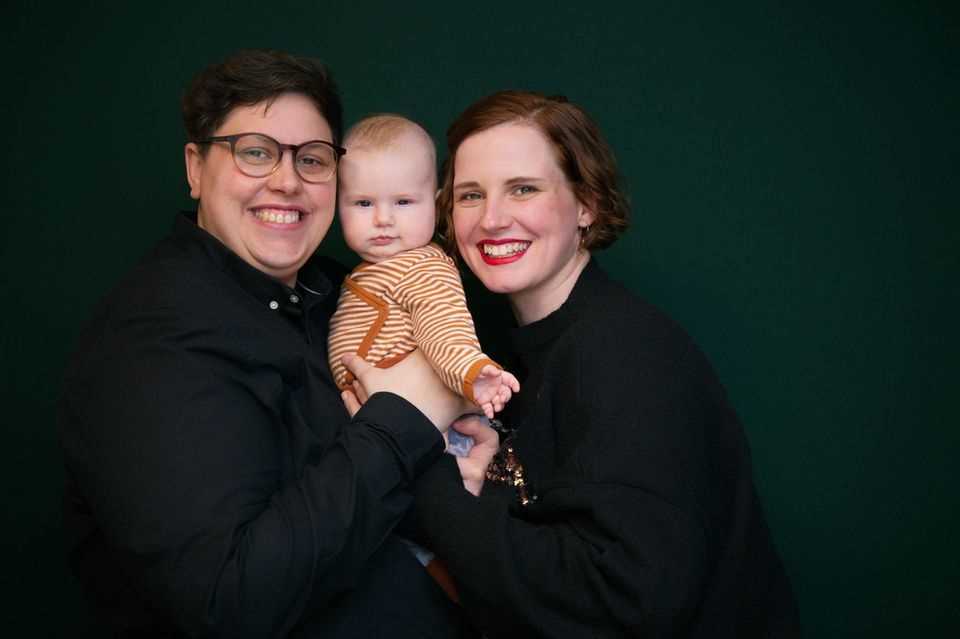Two queer pastors who authentically and confidently share their lives with the whole world via YouTube – do we have to say more? We definitely do! Ellen and Stefanie Radtke are our strong women this month.
God? Isn’t that the ominous force that was behind the Crusades in the Middle Ages? In whose name wars were waged and people “missioned” who believed in things like nature spirits and mystical taboos? And which the Pope refers to when he says that same-sex couples cannot be blessed? No, completely impossible, there must be a misunderstanding. After all, such a force would never give the floor to Ellen and Stefanie Radtke.
Rainbow family meets village – and YouTube …
Ellen and Steffi Radtke are pastors – in the Protestant Church, of course, because in the Catholic Church only men can currently do this job – and also a couple. They got to know each other while studying theology, at first sight they couldn’t relate to each other (to put it in a friendly way …), but then fell so violently on the second that they moved in together after just a few weeks. They have been coupled since 2007, in 2012 they said “yes” to each other and entered into a registered civil partnership. In 2017, after the opening of “Marriage for All”, they got married. Ellen would locate herself as pansexual if the question of sexuality had not been superfluous with the commitment to a monogamous relationship, which is precisely why Steffi describes herself as “ellie-sexual”.
Since 2017 the couple has lived in the Lower Saxon village of Eime, where Steffi holds the parish office, last year their daughter Fides (Latin for “faith”) was born from abroad thanks to fertility treatment and sperm donation, and once a week the Christian rainbow family leaves all of Germany her YouTube channel “Other names“Participate in your life in a friendly and super funny way. But it is there, of all places, and in the other social media, which are known to be full of colorful people, that the couple experiences the most rejection. Not in her parish Eime, not in the institution of the Protestant Church, but on Instagram, Facebook and YouTube, where people upload 20,000 calorie challenges and convince millions of subscribers with Pranks …
Hatred and agitation on the net: “Hopefully you will get a freak”
“From the comments under our videos or posts, we can always tell if we have been reported in any conservative media,” says Steffi. Right-wing portals called for some expressly to have and to comment negatively – it could not be “that there is only positive things under it”. Death threats, abusive statements such as “the ugly fat one” or “one of them is far too pretty to be a lesbian” are usually the result.
One of the most violent comments in recent times related to Fides while Ellen was pregnant with her: The hater expressed a wish that she would become a “freak” so that the mothers would know what God thought of their relationship. That hit Ellen most of all, “maybe it was because of my hormones during pregnancy …” she says. “Usually we pass hostility on to our team and laugh about it together. It’s hard to ignore completely. But it helps to be aware that these comments say something about the people who post them.” They both understand that giving in and pulling back is exactly what the haters want to achieve. That’s why they don’t. Thank god – because what they are setting an example and what they have to say should please, please, please not only the people in Eime and not only Christian evangelical circles.
Opposites also fit together
Whether in your videos, your posts on Insta or in a direct conversation: Ellen and Steffi embody authenticity, inclusion, love and tolerance. The mere fact that two people are as different as they are a couple at first glance, shakes all relationship studies that claim that similarities are the best basis for a partnership: Steffi, the “poltergeist” who is always loud and cheerfully goes on and on (her words!), and Ellen, the reflective, thoughtful, loving woman who “sees everyone” with her motherly eyes (also Steffi’s words) – two characters, on the surface, could hardly be more different.
Also the stories of the two: Ellen has always felt a connection to God. She grew up with the Catholic faith and only decided to convert some time after her confirmation, as she could not identify with certain rules of the Catholic Church – such as the exclusion of women from the pastoral office. For a long time she hadn’t thought about the fact that she could not only love men. “I used to do a lot of make-up and was a real chick,” she says, “in my head that didn’t go well with women.”
And what about Poltergeist Steffi? It suddenly occurred to around 16 that she was baptized and slowly had to go to confirmation class, like her classmates. But because she didn’t just want to do it for the money and partying, she bet God that after confirmation she would continue to come to church once a month for at least a year – and one year turned into years. “The church has always been a place for me to come down,” she says. “Where I was allowed to be and not have to prove anything to anyone.” For her as a “poltergeist” a pleasant experience. On the other hand, she has always felt that her love or sexuality is not tied to one gender. “I’ve never really thought about it. I’ve always trusted that I feel love when I should. And if I hadn’t felt it, I would have been happy on my own.”

Happy family: Steffi, Fides and Ellen Radtke (from left)
© Clemens Beckmann / private
“We can only be racists who don’t want to be”
Have they perhaps solved the riddle of how we manage to approach people openly and impartially? Not to be pigeonholed based on external appearance? Conditionally. “For me it is the case that I put people in a drawer very quickly, but they come out again easily,” says Steffi, “With Ellen it tends to take longer, but then it is ‘more definitive’.” Which would provide the proof: The two are only human. “We just have to admit that we can never get out of this categorization“, says Ellen.” We will always get a picture of a person within the first seven seconds and sort them – our brain is designed in such a way that it needs clarity and the question arises, ‘Who can I trust?’. But if we are aware of this, we can reflect and question our classifications. We basically only have to be racists who don’t want to be. ”
If we notice again that our drawers cause us to distance ourselves from people, exposure therapy helps: “For a long time Steffi had a problem with seeing men kissing,” says Ellen. “Prince Charming ‘helped with that.” Thanks to the dating program, Steffi is now only bothered by the many naked bottoms when she is at the CSD. Well now.
“I like funerals best”
What many people will certainly ask, especially those who have nothing to do with the church: Why do these two modern, free-spiritual, inspiring women work for such a conservative, dusty, listed, sluggish employer? What do you like about your job? “I like funerals best,” says Ellen. “Then you always notice that faith can help and give consolation. We really have something to say about hope and eternity. That’s why I am happy when the undertaker calls.” Steffi adds: “In what other job do you still get paid to have time for people today?” It is your job to see what the people in your community need and to be there for them. That not only makes the job meaningful, but also varied and creative. “One day we are mourning companions, the other we walk through the village and distribute toilet paper,” says Steffi. “Only the working hours are sometimes tough: we always have to be available.”
For the future, the two theologians want one thing first and foremost: that we stick together and take care of each other! “If everyone looks at what is good for my neighbor right now – and if politics also decide what people need based on it – then we will improve something together,” says Ellen. She advises concentrating on the positive developments and strengthening them instead of pointing the finger at mistakes and complaining. “Of course it is always easy to criticize and, for example, to present ‘the backward Catholic Church’,” says the pastor, “but there are so many progressive movements, women who work for the church and are committed to the empowerment of women – We should orientate ourselves by them, we should promote them. ”
It has come full circle …
Perhaps with this approach we can finally close the unfortunate barrel that we opened at the very beginning: This reproach to God, which authorizes the Pope to exclude homosexual couples, for example, is passed on by many believers directly to the church – do not be God the problem but the institution. That in turn raises the question: Why are we actually sticking to this institution? How about: If the church is an institution that includes people like Steffi and Ellen Radtke, takes them into their midst and lets them speak for themselves, then we need them, because then they enrich our society (by the way, writes and feels a staunch atheist). All we have to do now is convince the Pope and some leaders of other religions …
